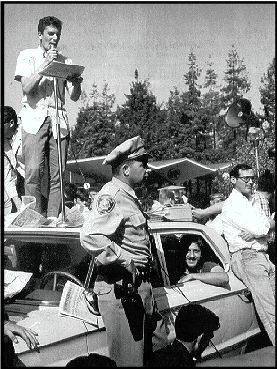
Forty years ago next week, the administration of the University of California of Berkeley, at the behest of Senator William Knowland, forbade students from organizing on campus for off-campus political activity, such as the daily picket lines sponsored by the Congress of Racial Equality (CORE) that were then occurring in front of restaurants in Oakland’s Jack London Square that refused to hire men & women of color. The students felt that this ban was clearly an unconstitutional abridgement of the rights of the freedom of speech & assembly and determined to challenge it with a test case. One student, Jack Weinberg, set up a card table at the Bancroft Way entrance to Sproul Plaza and was promptly taken into custody by the campus police who deposited him into a Berkeley police car for a quick trip down to the station.
Something, however, happened. As the car got ready to leave Sproul Plaza, it found its path blocked by students who had spontaneously gathered around. Not ten or twenty students. Not even hundreds. Thousands of students gathered and by simply standing around the police car for the next 36 hours set off the first “campus rebellion” of the 1960s. In short order, the roof of the police car – Weinberg & the cops still inside – became the stage for an impromptu & powerful teach-in, as speaker after speaker explained why what the University was doing was wrong and why as students and
as citizens they had a responsibility to halt this. None proved more eloquent than a lanky philosophy major by the name of Mario Savio.
In 1964, it took the entire school year for the events set off by this unplanned moment of refusal to play themselves out. The crowd around the police car coalesced into the Free Speech Movement (FSM), led by Savio, David Goines, Bettina Aptheker, Art Goldberg, Michael Rossman & many, many others. There was a sit-in in the administration building, followed by hundreds of arrests. The portly & evil assistant district attorney assigned to prosecute the students at the sit-in would himself become famous & go on to become Ronald Reagan’s portly & evil attorney general. But the students ultimately won, earning permanently the right to organize protests.
What flowed from that initial spontaneous event would take days to explain here, just as it took years, literally, to be absorbed by a society that was only then beginning to understand that it was sliding into the morass of the Vietnam War. Indeed, it would be the following fall of 1965 when UC Berkeley also would see the very first anti-war teach-in in the United States, the one for which they coined the phrase “teach-in.”
Forty years have seen enormous changes in this nation. Weinberg, who became famous (or infamous) for his phrase “Never trust anyone over 30” is twice that age. Savio, who worked hard to avoid being chewed up by the media as the first “celebrity protestor,” went on to become a professor at Sonoma State before dying of a heart attack at the age of 53. One student who was part of the Sproul Hall sit-in went on to build the first Apple Computer.
At the time, I was a shipping clerk for PG&E, the utility company. I came by after work and spent that evening standing around the patrol car, listening to speeches – normally I would have been picketing a restaurant in Jack London Square. Frankly that event helped move me toward the decision to go to college in the first place, an idea that did not occur naturally in my family.
Next week – starting on Monday with a showing of the film Berkeley in the Sixties at the Free Speech Movement Café on campus – the UC community and the hundreds of surviving member of that old crowd around the police car will commemorate that extraordinary moment in U.S. history when
students simply refused to let the inevitable happen & took control over their own destiny. The highlight will come on Friday, October 8th, at noon, when there will be a rally in Sproul Plaza, where FSM speakers will dissect the Patriot Act & other clear and present dangers to civil liberties that challenge us now. I plan to be at that rally, which will be gathered around a police car.





